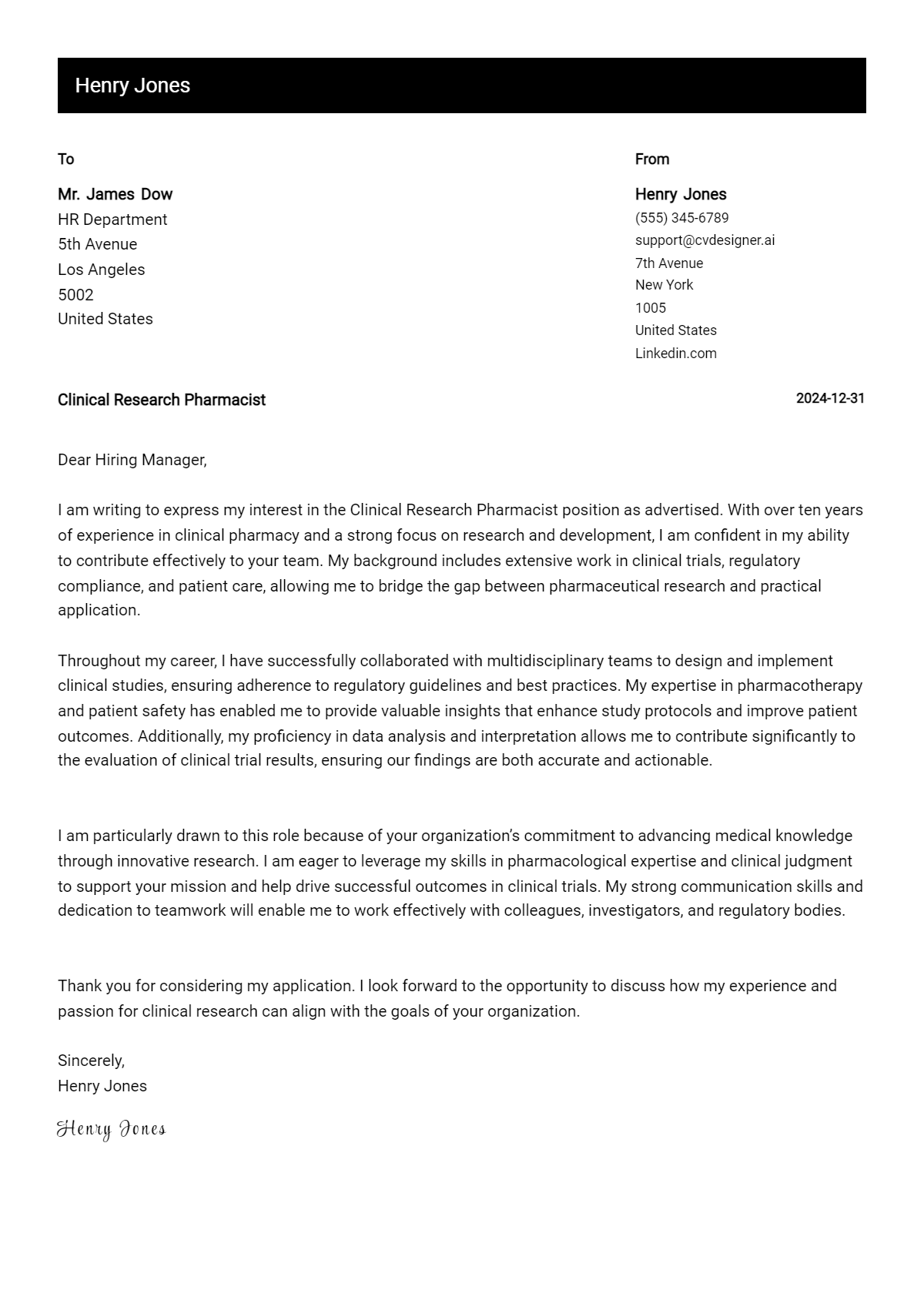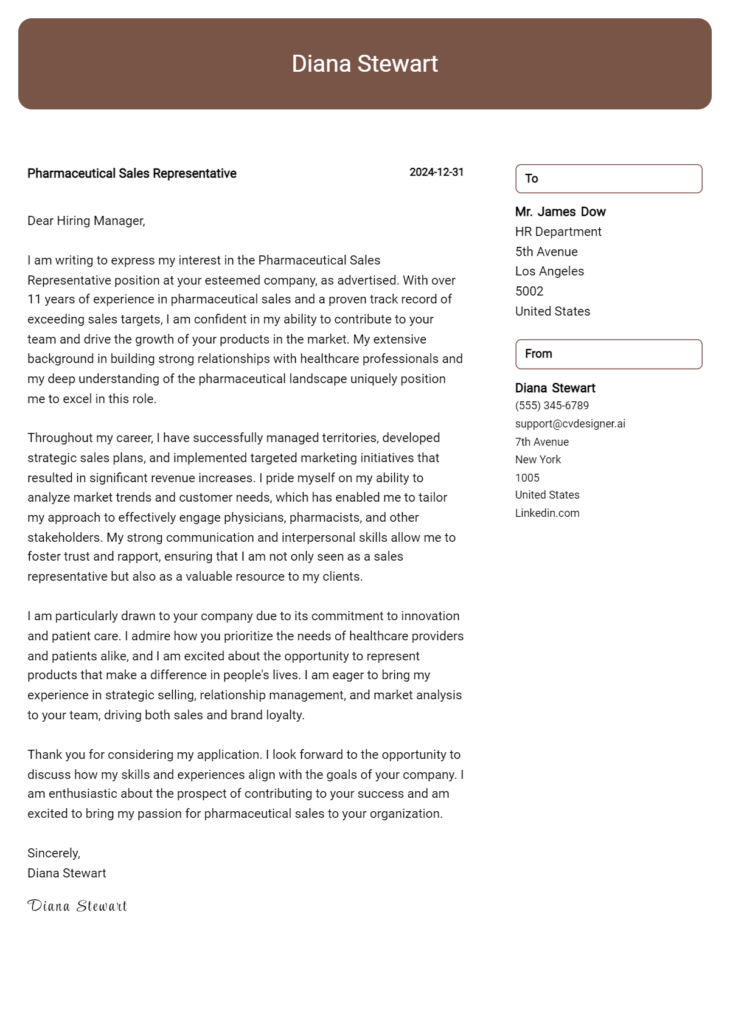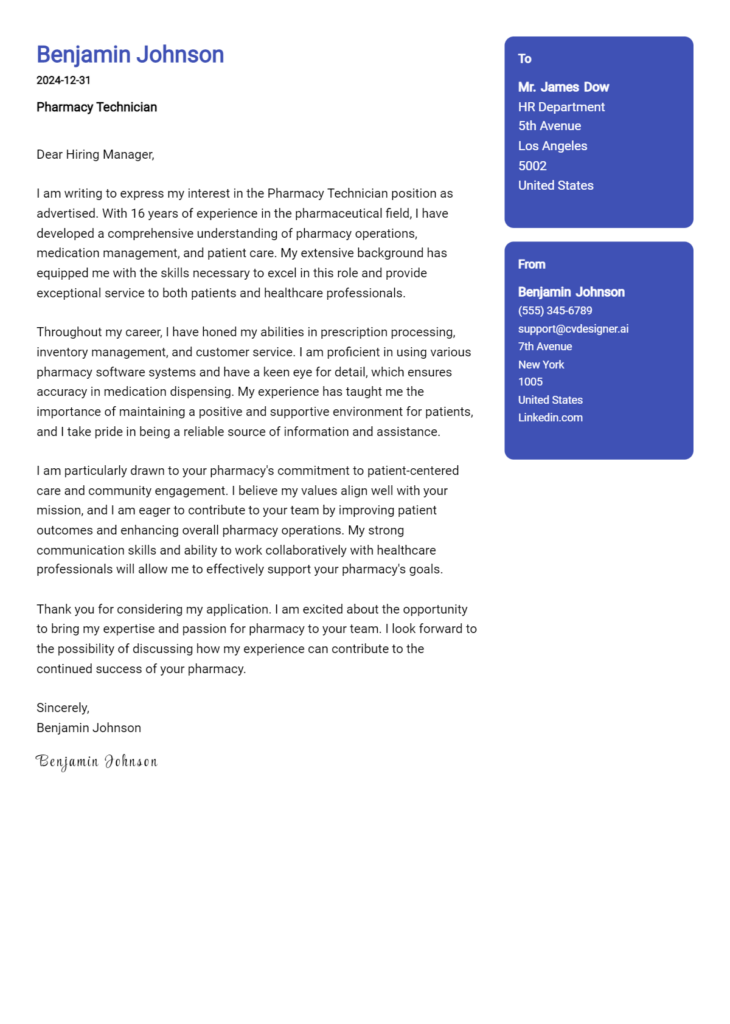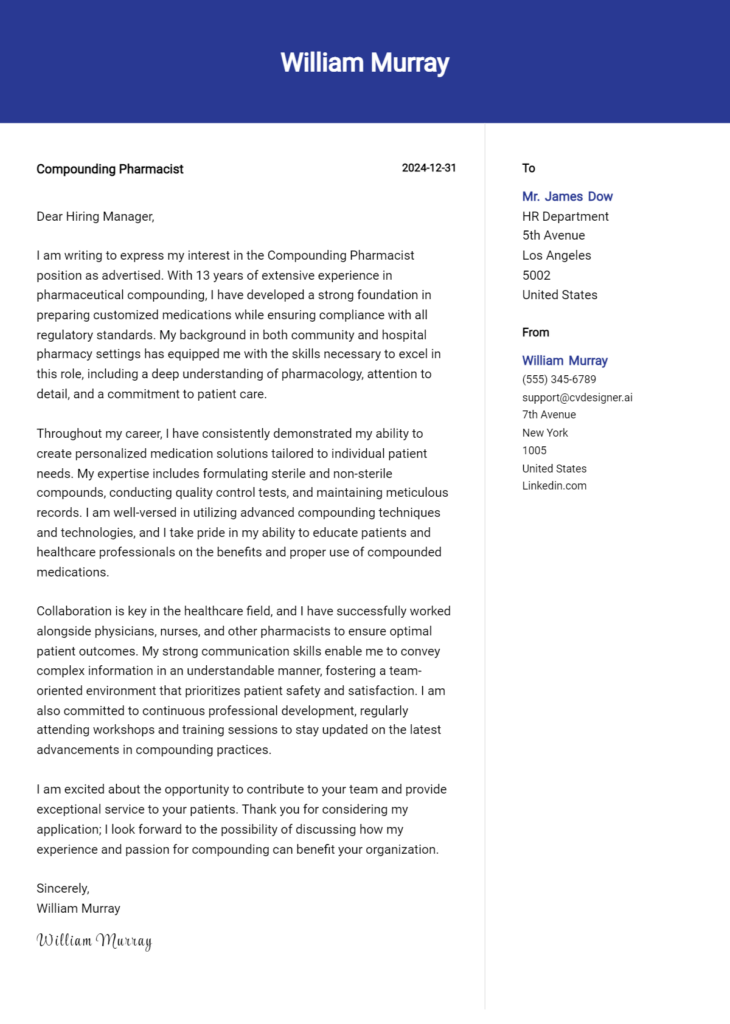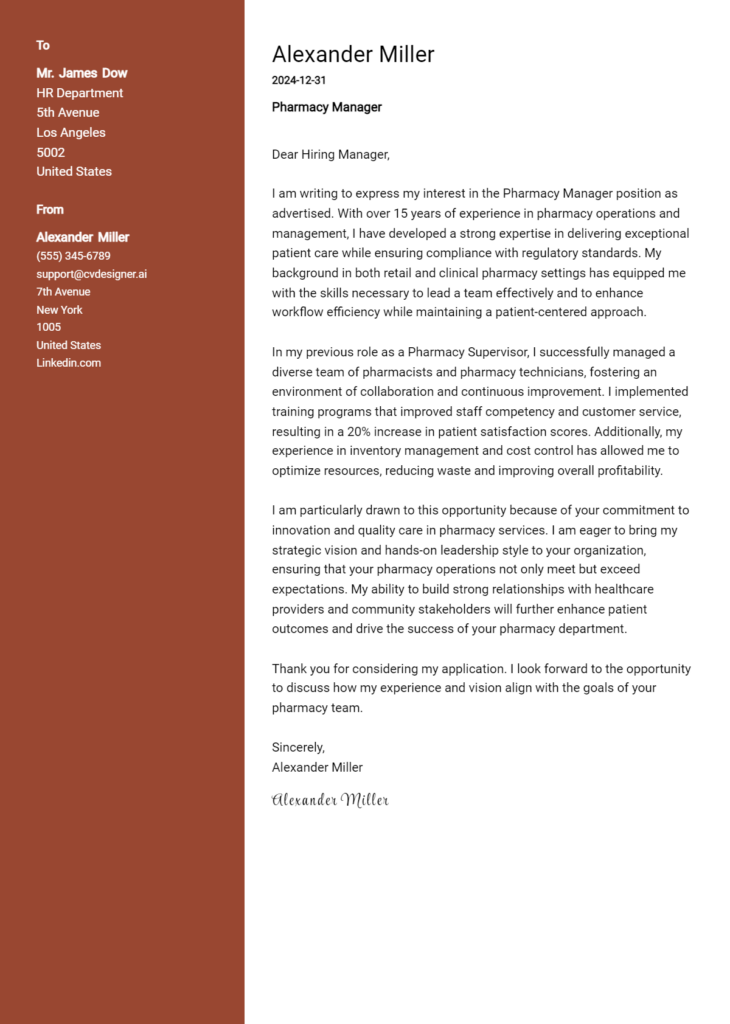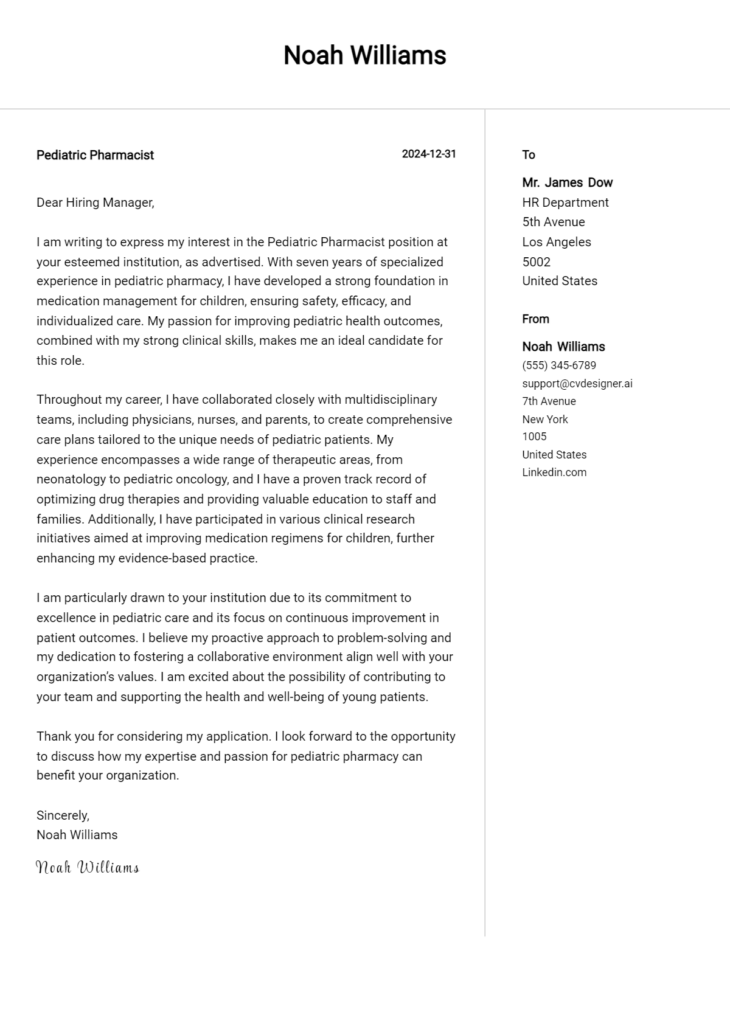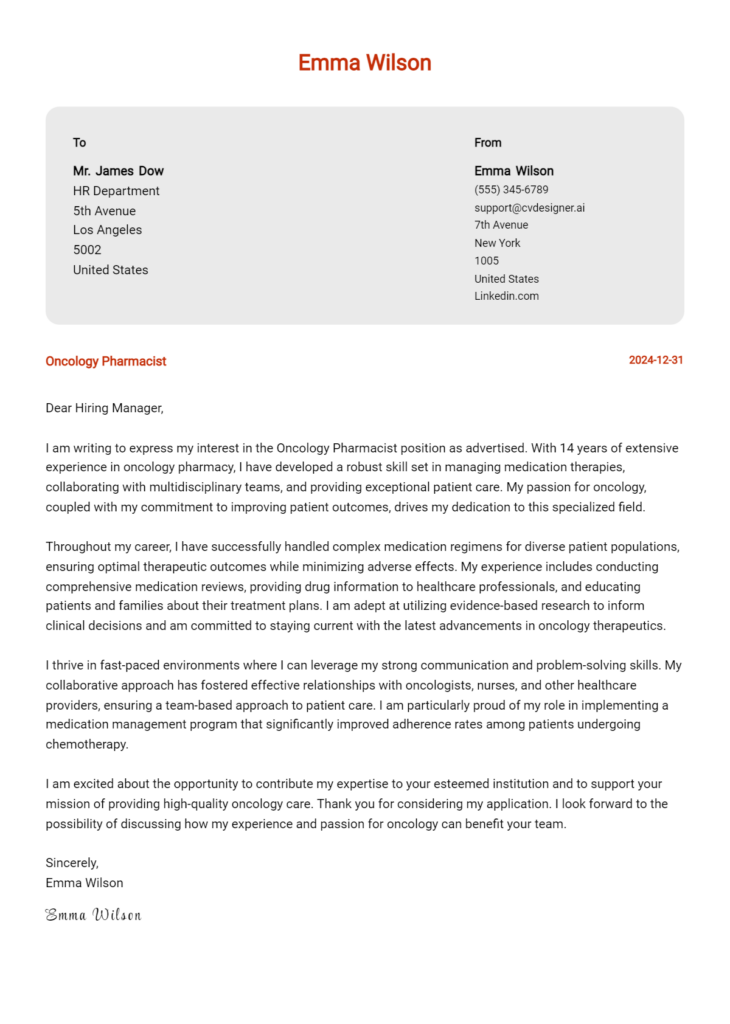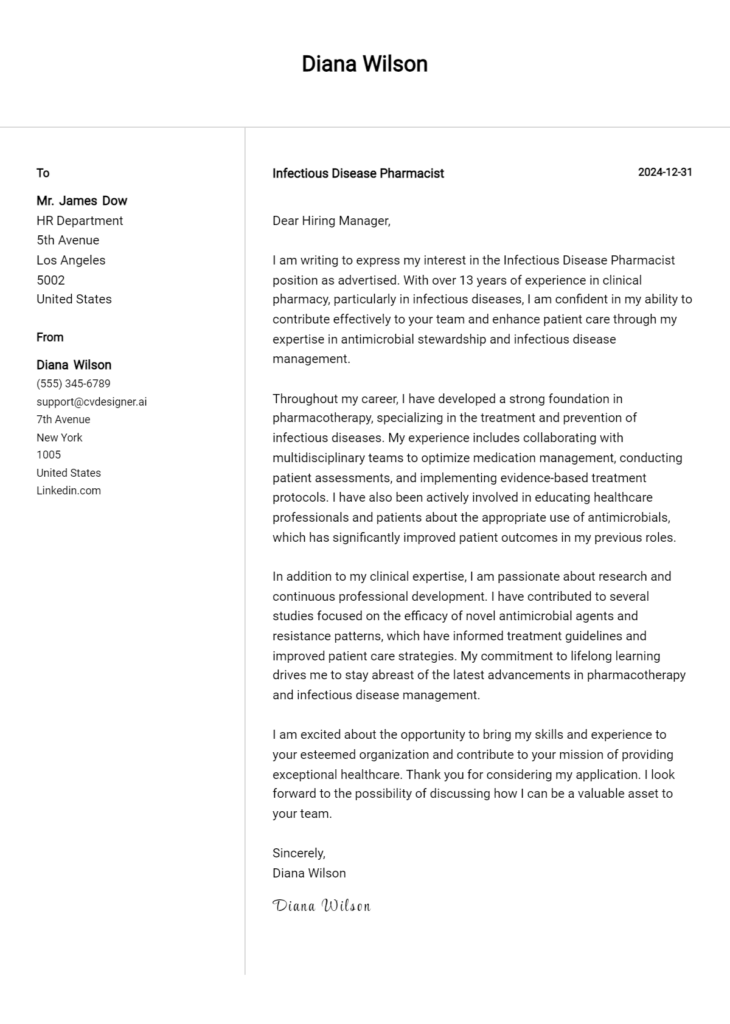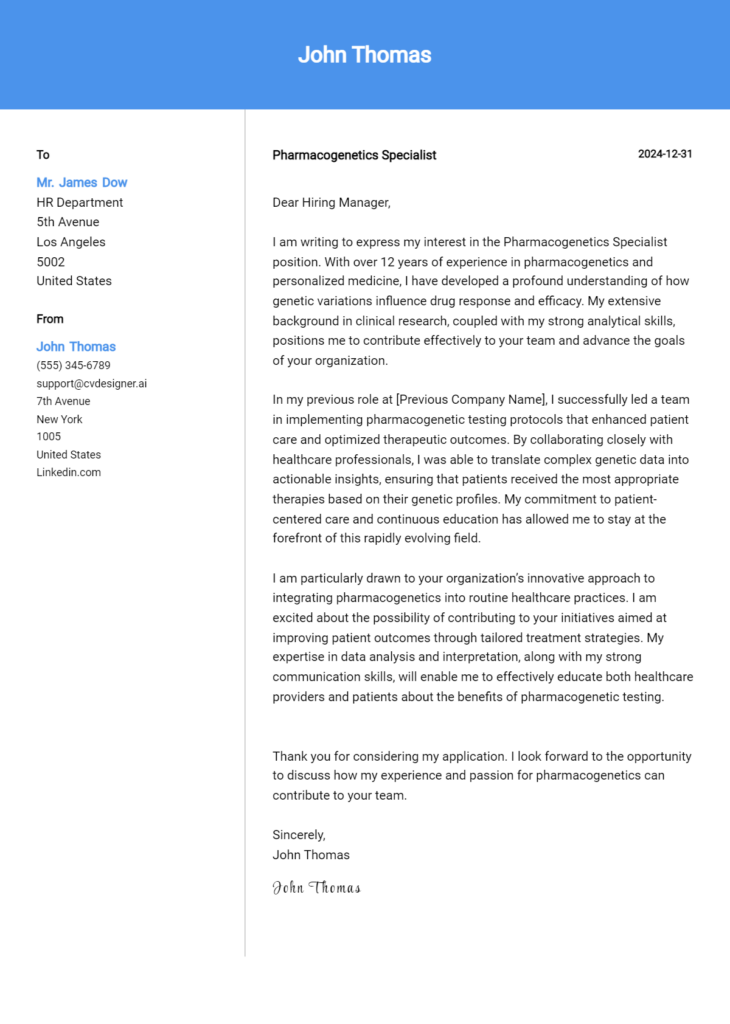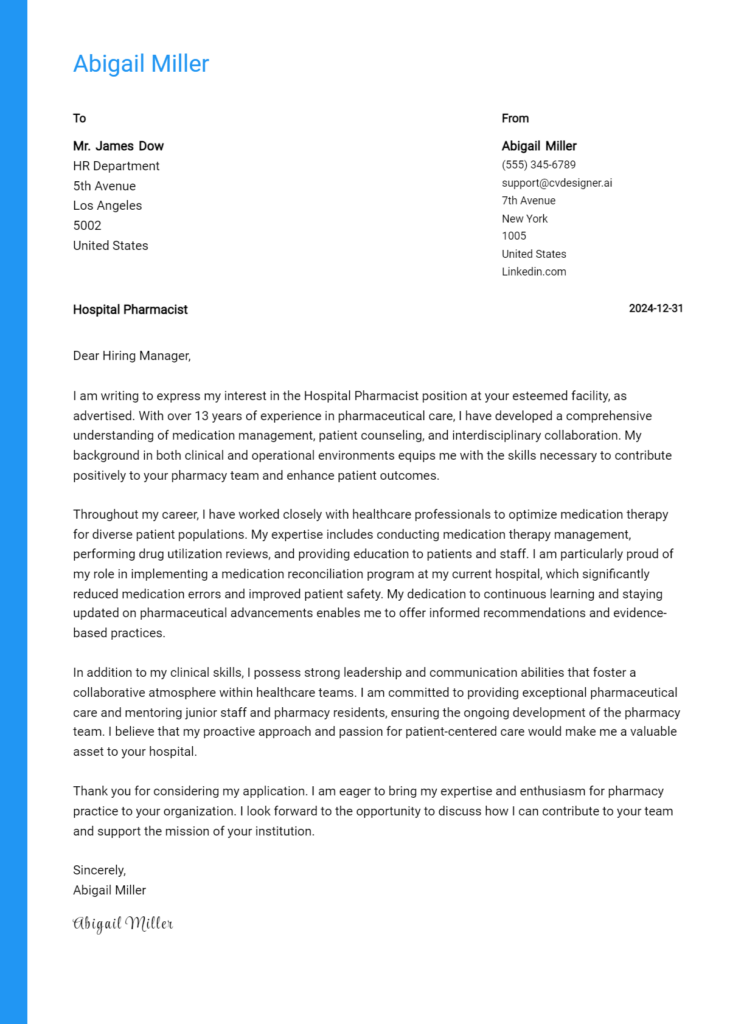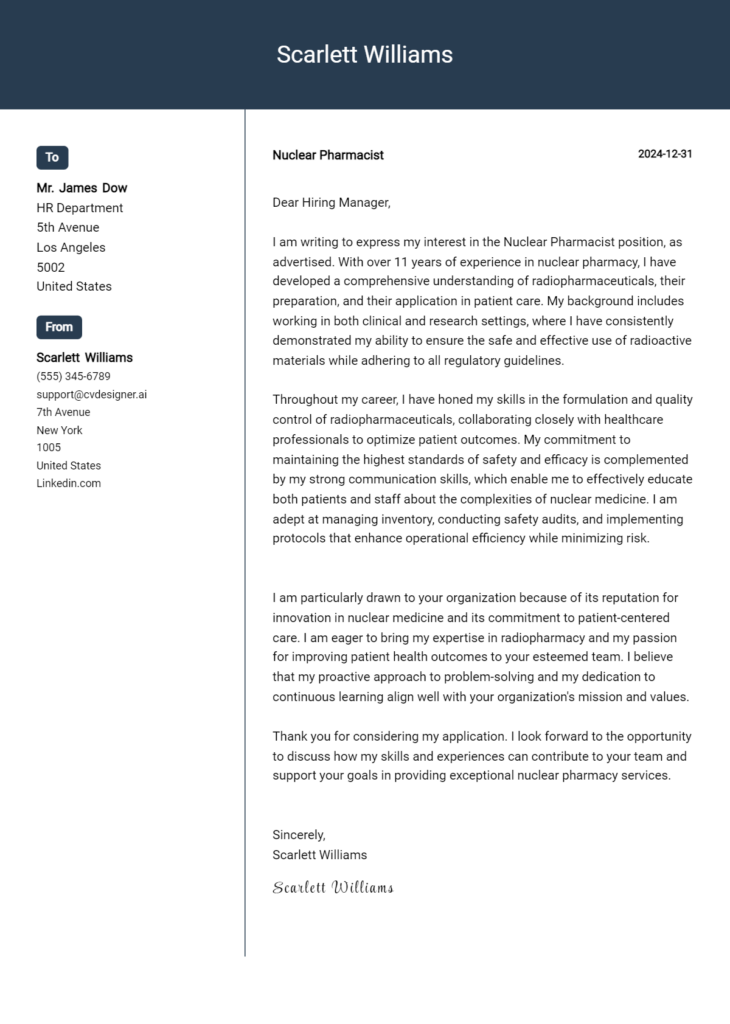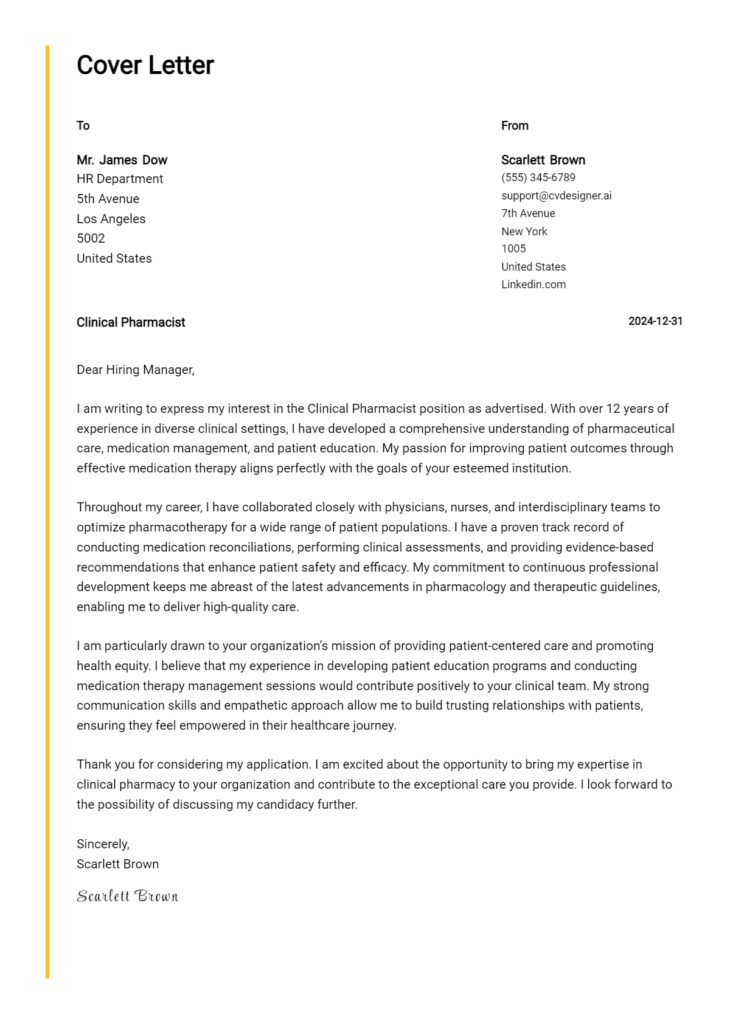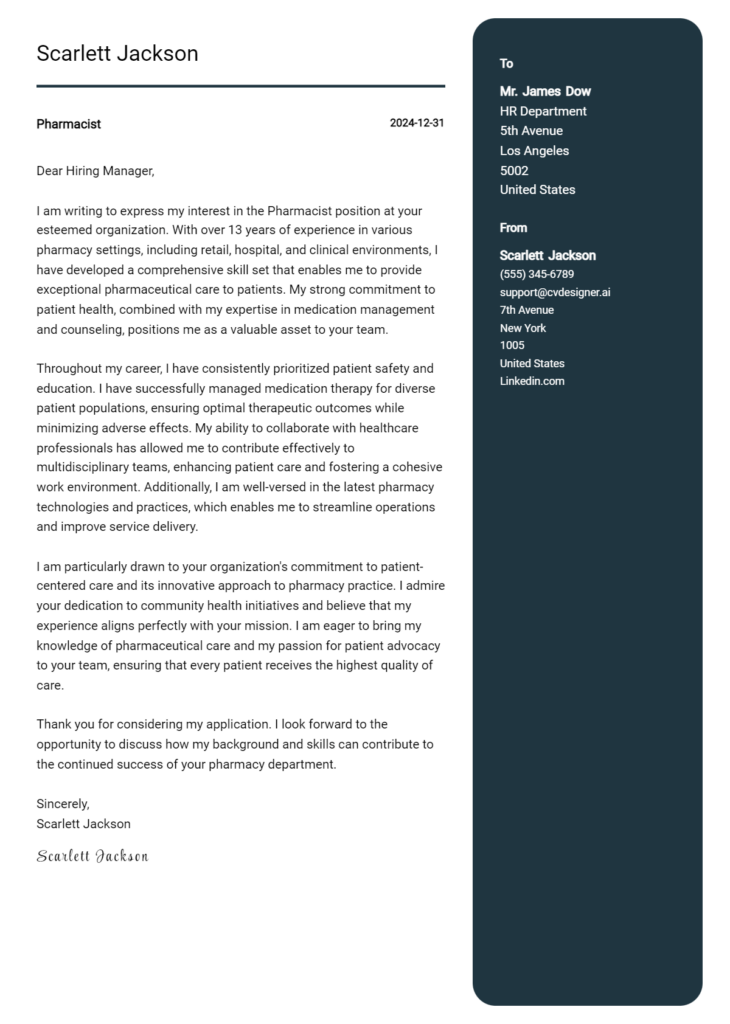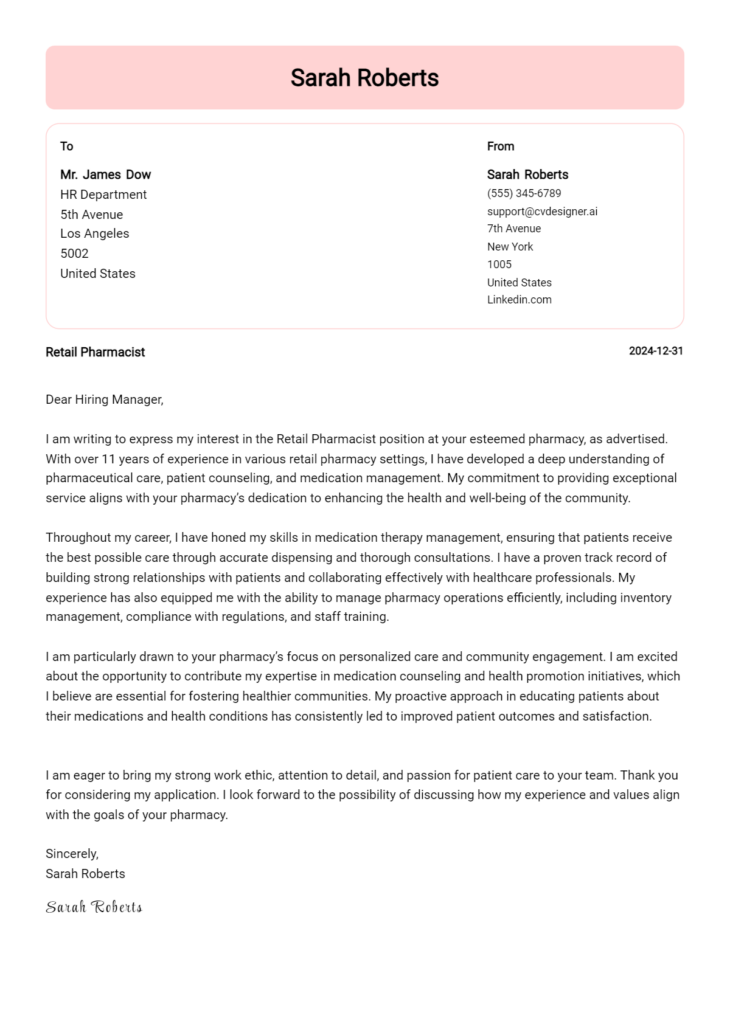Clinical Research Pharmacist Cover Letter Examples
Explore additional Clinical Research Pharmacist cover letter samples and guides and see what works for your level of experience or role.
How to Format a Clinical Research Pharmacist Cover Letter?
Crafting a compelling cover letter is essential for a Clinical Research Pharmacist, as it serves as your first opportunity to make a strong impression on potential employers. The way you format your cover letter not only conveys your professionalism but also reflects your organizational skills and attention to detail—traits that are vital in clinical research settings. A well-structured cover letter can effectively highlight your relevant experience, knowledge of regulations, and commitment to patient safety, thus setting you apart from other candidates.
In this guide, we will outline how to structure your cover letter effectively, providing insights and examples tailored specifically for Clinical Research Pharmacists.
We'll focus on the essential components of a professional cover letter, including:
- Cover Letter Header
- Cover Letter Greeting
- Cover Letter Introduction
- Cover Letter Body
- Cover Letter Closing
Each section plays a crucial role in showcasing your qualifications and expertise. Let’s delve into each part and explore how to make your Clinical Research Pharmacist cover letter stand out.
Importance of a Cover Letter Header for a Clinical Research Pharmacist
A well-structured cover letter header is crucial for any Clinical Research Pharmacist as it sets the tone for the entire application. The header should include essential information such as the applicant's contact details, the date, and the recipient's information. Clarity and professionalism in this section are paramount, as they create a positive first impression and demonstrate attention to detail—qualities that are vital in clinical research. A strong header effectively communicates who you are and how to reach you, while a weak one may lead to confusion or appear unprofessional.
Strong Example
Dr. Jane Smith, PharmD 123 Main Street Cityville, ST 12345 jane.smith@email.com (123) 456-7890 October 1, 2023 Mr. John Doe Hiring Manager Clinical Research Department Pharma Solutions Inc. 456 Industry Road Business City, ST 67890
Weak Example
Jane S. Somewhere 10/01/23 To Whom It May Concern
The Importance of the Cover Letter Greeting for a Clinical Research Pharmacist
The greeting of your cover letter is a critical element that sets the tone for the entire document. A well-crafted greeting not only demonstrates your professionalism but also your attention to detail and personalization. By addressing the hiring manager directly, you establish a connection that can make your application stand out among others. Avoiding generic greetings such as "To Whom It May Concern" reflects your commitment to the position and willingness to invest time in researching the organization and its personnel. If you are unsure of the recipient's name, take the initiative to look it up through the company’s website or LinkedIn. This small effort can significantly enhance the impact of your introduction.
Strong Greeting Example
Dear Dr. Jane Smith,
Weak Greeting Example
To Whom It May Concern,
The Importance of a Strong Cover Letter Introduction for Clinical Research Pharmacists
A well-crafted cover letter introduction is essential for a Clinical Research Pharmacist as it serves as the first impression on the hiring manager. This introductory paragraph should not only capture attention but also convey genuine enthusiasm for the role and briefly highlight key skills or relevant achievements. A compelling introduction sets the tone for the rest of the letter, demonstrating the candidate’s suitability for the position. Below are examples of strong and weak introductions to illustrate the difference in impact.
Strong Example
Dear [Hiring Manager's Name], I am excited to apply for the Clinical Research Pharmacist position at [Company Name], as I believe my extensive experience in clinical trials and my passion for innovative patient care make me an ideal candidate for this role. With over five years of experience collaborating with multidisciplinary teams on Phase II and III clinical studies, I have successfully managed drug supply chains and ensured compliance with regulatory standards, resulting in a 30% increase in study efficiency. I am eager to bring my expertise in pharmacotherapy and my commitment to advancing clinical research to your esteemed organization.
Weak Example
To Whom It May Concern, I am writing to express my interest in the Clinical Research Pharmacist position. I used to work in a pharmacy and have some experience with research. I think I would be a good fit for this job because I like helping people and am willing to learn more about clinical research.
Purpose of the Cover Letter Body for a Clinical Research Pharmacist
The cover letter body for a Clinical Research Pharmacist serves as a critical platform for candidates to articulate their unique qualifications, relevant experiences, and the specific value they can bring to the organization. It allows candidates to showcase their expertise in clinical trials, regulatory compliance, and patient safety, while also highlighting key projects that reflect their capabilities. By detailing accomplishments, such as successful implementation of a new medication protocol or leading a research initiative that improved patient outcomes, candidates can effectively demonstrate their contributions to previous employers. This tailored narrative not only helps to differentiate them from other applicants but also aligns their skills with the needs of the hiring organization.
Strong Example
Dear Hiring Manager, I am excited to apply for the Clinical Research Pharmacist position at [Company Name]. In my previous role at [Previous Company], I successfully led a team in the development and implementation of a novel medication management protocol that improved patient adherence rates by 25%. Additionally, my work on a multi-center clinical trial for a new oncology drug resulted in a 15% increase in patient enrollment, contributing to the project's timely completion and subsequent FDA approval. My strong background in pharmacotherapy and my commitment to enhancing clinical outcomes make me a valuable asset to your team. Sincerely, [Your Name]
Weak Example
Dear Hiring Manager, I am writing to express my interest in the Clinical Research Pharmacist role. I have some experience in pharmacy and have worked on a few projects in the past. I am a hard worker and believe I can be helpful to your company. I think my skills could be applicable, but I am still learning about clinical research. Best regards, [Your Name]
Importance of the Cover Letter Closing for a Clinical Research Pharmacist
The closing paragraph of a cover letter is crucial as it serves to summarize the applicant's qualifications, reiterate their interest in the position, and encourage the hiring manager to take the next steps, such as reviewing the resume or scheduling an interview. A strong closing can leave a lasting impression and motivate the employer to consider the candidate more favorably. Conversely, a weak closing may fail to convey enthusiasm or may not prompt any action, potentially diminishing the overall impact of the letter.
Strong Example
Thank you for considering my application for the Clinical Research Pharmacist position. With my extensive background in clinical trials, combined with my passion for advancing pharmaceutical research, I am excited about the opportunity to contribute to your team. I am eager to discuss how my experience can benefit your organization and would welcome the chance to schedule an interview. Please find my resume attached for your review, and I look forward to the possibility of working together to advance innovative therapies.
Weak Example
I hope you look at my resume. I think I would do okay in the Clinical Research Pharmacist job. Let me know if you want to talk.
These tips will guide candidates in crafting an effective cover letter for a Clinical Research Pharmacist position, emphasizing the necessity of showcasing technical skills, problem-solving abilities, knowledge of the Software Development Life Cycle (SDLC), teamwork, and a passion for continuous learning. A well-structured cover letter can set you apart in a competitive field by effectively communicating your qualifications and enthusiasm for the role.
Tips for Writing a Cover Letter for Clinical Research Pharmacist
Highlight Technical Skills
Begin your cover letter by clearly outlining your technical competencies relevant to clinical research. Mention specific software tools, databases, or methodologies you are proficient in. This could include familiarity with clinical trial management systems (CTMS) or electronic data capture (EDC) tools. Including these details can demonstrate your readiness to contribute effectively from day one.Showcase Problem-Solving Abilities
Illustrate your problem-solving skills by providing examples of challenges you have faced in previous roles and how you overcame them. Describe a specific situation where you identified a medication-related issue or a complication in a trial and the steps you took to resolve it. This narrative helps potential employers see your analytical thinking in action.Demonstrate Knowledge of SDLC
Employers value candidates who understand the Software Development Life Cycle, especially in roles that involve data management and analysis. Discuss any experience you have with the SDLC, especially in terms of how it relates to drug development and clinical trials. Emphasizing your familiarity with this process shows your ability to bridge the gap between pharmacy and technology.Emphasize Teamwork and Collaboration
Clinical research is inherently collaborative. Use your cover letter to highlight your experience working in interdisciplinary teams. Share specific examples of how you contributed to successful outcomes through collaboration with physicians, researchers, and other healthcare professionals. This demonstrates your ability to work well with others, a key trait for a Clinical Research Pharmacist.Convey a Passion for Continuous Learning
The field of clinical research is constantly evolving. Make sure to express your commitment to staying updated with the latest advancements in pharmaceuticals and clinical practices. Mention any relevant certifications, workshops, or courses you have completed recently. This not only shows initiative but also your dedication to professional growth within the industry.
By following these tips, you can create a compelling cover letter that effectively presents your qualifications and enthusiasm for the Clinical Research Pharmacist role. For additional resources, consider exploring cover letter templates or try our cover letter builder to streamline your writing process.
Common Mistakes to Avoid in a Clinical Research Pharmacist Cover Letter
Crafting a compelling cover letter is essential for standing out in the competitive field of clinical research pharmacy. Avoiding common mistakes can significantly enhance your chances of making a positive impression. Here are some frequent pitfalls to watch out for:
Generic Greetings: Using a generic salutation such as "To Whom It May Concern" can make your letter seem impersonal. Always try to address the hiring manager by name to create a connection.
Lack of Focus on Relevant Skills: Failing to highlight specific skills related to clinical research can weaken your application. Tailor your cover letter to emphasize your experience with clinical trials, regulatory compliance, and patient care.
Overly Lengthy Content: A cover letter should be concise and to the point. Aim for a single page, and prioritize the most relevant information. If you're unsure about what to include, refer to cover letter examples for inspiration.
Typos and Grammatical Errors: Errors in spelling or grammar can undermine your professionalism. Always proofread your letter multiple times and consider using tools or asking a colleague to review it.
Neglecting to Research the Company: Not demonstrating knowledge about the organization can signal a lack of genuine interest. Research the company’s mission, values, and recent projects, and incorporate that information into your letter.
Using a One-Size-Fits-All Approach: Sending the same cover letter to multiple employers may lead to missed opportunities. Customize each letter to reflect the specific position and organization you are applying to.
Ignoring Proper Format: A disorganized or unprofessional format can detract from your message. Follow a clear structure and refer to guidelines on cover letter format to ensure your letter is visually appealing.
By steering clear of these common mistakes, you can create a more impactful and professional cover letter that showcases your qualifications as a Clinical Research Pharmacist.
Cover Letter FAQs for Clinical Research Pharmacist
What should I include in my cover letter as a Clinical Research Pharmacist?
In your cover letter, highlight your relevant experience in clinical research, emphasizing any specific projects you’ve been involved in. Mention your knowledge of pharmacology, regulatory compliance, and Good Clinical Practice (GCP) guidelines. Detail your skills in data analysis and patient safety, as well as your ability to collaborate with multidisciplinary teams. Additionally, express your passion for advancing pharmaceutical knowledge and improving patient outcomes. Tailor your letter to the specific organization and role, using keywords from the job description to demonstrate your alignment with their needs.
How can I showcase my experience in clinical trials?
To effectively showcase your experience in clinical trials, provide specific examples of your roles and contributions. Mention any clinical studies you’ve managed or participated in, including your responsibilities in protocol development, patient recruitment, or data collection. Discuss any challenges you faced and how you overcame them, highlighting your problem-solving skills. If applicable, quantify your achievements, such as the number of trials completed or improvements in patient adherence rates. Using concrete examples will demonstrate your capability and commitment to clinical research.
Should I address my cover letter to a specific person?
Whenever possible, address your cover letter to a specific person, such as the hiring manager or the head of the clinical research department. This demonstrates your attention to detail and genuine interest in the position. If the job posting does not provide a name, consider researching the company’s website or LinkedIn to identify the appropriate person. If you cannot find a name, use a neutral greeting, such as "Dear Hiring Manager." Avoid generic salutations like "To Whom It May Concern," as they can make your application seem less personalized.
How do I convey my passion for clinical research in my cover letter?
To convey your passion for clinical research, share a personal story or experience that inspired you to pursue this career path. Discuss any relevant volunteer work, internships, or educational experiences that fueled your interest in clinical trials and patient safety. Highlight specific aspects of clinical research that excite you, such as the opportunity to contribute to innovative therapies or improve patient care. Use enthusiastic language and express your eagerness to make a meaningful impact within the organization. Showing genuine passion can set you apart from other candidates.
Build your Cover Letter in minutes
Use an AI-powered cover letter builder and have your letter done in 5 minutes. Just select your template and our software will guide you through the process.

